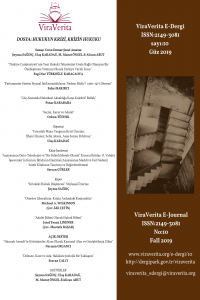Anayasanın Onto-Teleolojisi ve “Bir Felsefi Mesele Olarak” Kurucu iktidar: O. Vahdet İşsevenler’in Kurucu İktidarın Eleştirisi (Anayasanın Maddi ve Fail Nedeni) İsimli Kitabının Tanıtımı ve Değerlendirmesi
Öz
Anahtar Kelimeler
Kurucu İktidar Anayasanın Maddi Nedeni Anayasanın Fail Nedeni Anayasanın Onto-teleolojisi
Kaynakça
- Akal, C. B. (2014). Grundnorm’un Yolları Sonsuzdur. Kadir Has Üniversitesi Hukuk Fakültesi Dergisi, 2(3), 19-30.
- Freud, S. (1925). Uncanny. The Standard Edition of the Complete Psychological Works of Sigmund Freud, 17, 218-252. (A. Strachey, Çev.). London: The Hogarth Press.
- Illich, I. ve Sanders, B. (2015). ABC: Aklın Moderleşmesi. (İ. Avcı ve Ü. Şahin, Çev.). İstanbul: Yeni İnsan Yayınları.
- Jentsch, E. ve Sigmund F. (2019). Tekinsizliğin Psikolojisi Üzerine/Teknisizlik Üzerine. (H. Şahin, Çev.). İstanbul: Laputa Kitap.
- Kelsen, H. (1967). Pure Theory of Law. (M. Knight, Çev.). Clark, New Jersey: The Lawbook Exchange, Ltd.
- Kelsen, H. (1992). Introduction to the Problems of Legal Theory. (B.L. Paulson ve S.L. Paulson, Çev.). Oxford: Clarendon Press.
- Lewens, T. (2019). Bilimin Anlamı. (K. Kaynar, Çev.). İstanbul: İletişim Yayınları.
- Özcan, M. (2011). Aristoteles (Felsefesi: Temel Kavramlar ve Görüşler). Ankara: BilgeSu Yayıncılık.
- Ross, D. (2011). Aristoteles. (A. Arslan, Çev.). İstanbul: Kabalcı Yayıncılık.
- Schmitt, C. (2016). Siyasi İlahiyat. 5. Baskı. (A. E. Zeybekoğlu, Çev. ). Ankara: Dost Yayınevi.
The Onto-Teleology of Constitution and Constitutive Power as a “Philosophical Problem”: The Review of O. Vahdet İşsevenler’s Book The Critique of Constitutive Power (The Material and The Efficient Causes of Constitution)
Öz
In Turkish
constitutional law literature, the constitutive power has most commonly been
regarded as unpredictable, unknown, untested, unlimited and extra-legal. As
such, it has not been wholly elaborated, and has more often been ignored.
However, amongst the main problems of both constitutional theory and general
legal philosophy, there is also the concept of constitutive power. It is not
only a power which makes constitution, but at the same time is an essential
concept in examining how societies become a political body, govern themselves
and what the “raison d’être” and its limits are. Thus, in his book titled
Constitutive Power (The Material and The Efficient Causes of Constitution), O.
Vahdet İşsevenler, referring to the “Theory of Causes” as being addressed in
Socratic tradition, examines the nature of constitutive power, its properties
and function, and its relation to constitution from an onto-teleological
approach and argues for its dependence on “recognition”, asserting that the
constitutive power is in fact a kind of actualization and manifestation of some
probabilities and possibilities the political body has in itself potentially.
This review aims to introduce and to evaluate this work of İşsevenler.
Anahtar Kelimeler
Constitutive Power The Material Cause of Constitution The Efficient Cause of Constitution The Onto-Teleology of Constitution
Kaynakça
- Akal, C. B. (2014). Grundnorm’un Yolları Sonsuzdur. Kadir Has Üniversitesi Hukuk Fakültesi Dergisi, 2(3), 19-30.
- Freud, S. (1925). Uncanny. The Standard Edition of the Complete Psychological Works of Sigmund Freud, 17, 218-252. (A. Strachey, Çev.). London: The Hogarth Press.
- Illich, I. ve Sanders, B. (2015). ABC: Aklın Moderleşmesi. (İ. Avcı ve Ü. Şahin, Çev.). İstanbul: Yeni İnsan Yayınları.
- Jentsch, E. ve Sigmund F. (2019). Tekinsizliğin Psikolojisi Üzerine/Teknisizlik Üzerine. (H. Şahin, Çev.). İstanbul: Laputa Kitap.
- Kelsen, H. (1967). Pure Theory of Law. (M. Knight, Çev.). Clark, New Jersey: The Lawbook Exchange, Ltd.
- Kelsen, H. (1992). Introduction to the Problems of Legal Theory. (B.L. Paulson ve S.L. Paulson, Çev.). Oxford: Clarendon Press.
- Lewens, T. (2019). Bilimin Anlamı. (K. Kaynar, Çev.). İstanbul: İletişim Yayınları.
- Özcan, M. (2011). Aristoteles (Felsefesi: Temel Kavramlar ve Görüşler). Ankara: BilgeSu Yayıncılık.
- Ross, D. (2011). Aristoteles. (A. Arslan, Çev.). İstanbul: Kabalcı Yayıncılık.
- Schmitt, C. (2016). Siyasi İlahiyat. 5. Baskı. (A. E. Zeybekoğlu, Çev. ). Ankara: Dost Yayınevi.
Ayrıntılar
| Birincil Dil | Türkçe |
|---|---|
| Bölüm | Kitap Değerlendirmesi |
| Yazarlar | |
| Yayımlanma Tarihi | 20 Aralık 2019 |
| Gönderilme Tarihi | 20 Ekim 2019 |
| Yayımlandığı Sayı | Yıl 2019 Sayı: 10 |


